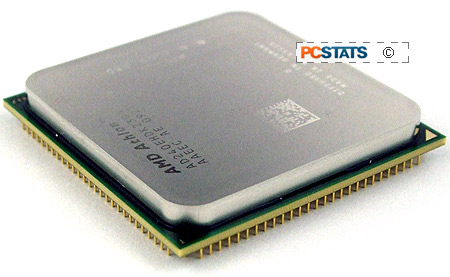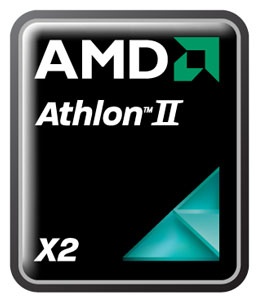 Making a processor like the Athlon II X2
240e is something that AMD
wouldn't have been able to do even a year ago, when the company was stuck on a
65nm manufacturing node and its processors tended to suck a lot of power and
make a lot of heat.
Making a processor like the Athlon II X2
240e is something that AMD
wouldn't have been able to do even a year ago, when the company was stuck on a
65nm manufacturing node and its processors tended to suck a lot of power and
make a lot of heat.
AMD's current generation of Phenom II and Athlon II
processors have trimmed off a lot of that excess power usage, and AMD has taken
advantage of it the smart way. Some of its processors, like the Phenom II, have
gotten a much-needed increase in speed to compete with the likes of Intel's Core
i5 and Core i7 series of processors. AMD's mainstream processors go in the
opposite direction, trading off potential speed increases for very real gains in
power efficiency and reductions in price.
 The 2.8GHz, $80 CDN ($77 USD, £50 GBP) Athlon II
X2 240e takes this design approach even further, and its 45W TDP makes it one of
the most efficient processors that PCSTATS has benchmarked. The only processor
that used less electricity under load was AMD's Sempron 3600+ chip.
The 2.8GHz, $80 CDN ($77 USD, £50 GBP) Athlon II
X2 240e takes this design approach even further, and its 45W TDP makes it one of
the most efficient processors that PCSTATS has benchmarked. The only processor
that used less electricity under load was AMD's Sempron 3600+ chip.
With 2MB of L2 cache and no L3 cache at all, the
performance of the Athlon II X2 240e isn't the fastest (in fact it was pretty
consistently the slowest), but it remains fast enough for use in office
applications and simple tasks like HD media decoding, while running applications
like BitTorrent at the same time. It can handle pretty much everything you'd
expect from an always-on office desktop computer.
When matched up with AMD's 785G chipset on a microATX
motherboard, it's possible to build a tiny Athlon II X2 240e-based system for
less than $400. The only real thing stopping the Athlon II X2 240e from sweeping
the low-wattage, low-price processor market is that AMD already has another
processors just like it in the form of the AMD Athlon II X2 250 processor. The Athlon II X2 250
draws a little bit more power (about 10W) and is a little bit faster (approx.
5-7%) and costs slightly more (around $10).
If you have to choose between the two, you'll likely
want the Athlon II X2 250 processor if you're building a primary computer system
that will need that bit of extra speed, and the Athlon II X2 240e for a PC
that's just staying on in the background. It's a tiny margin though, so either
processor can be a winner in the right setting.
